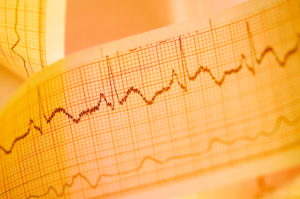por
Barbara Kram, Editor | December 24, 2009

Pros weigh in
on a semantic debate
You say tom-ATE-to. I say tom-AHH-to. You say
ECG. I say
EKG. But which is correct? We asked some people who ought to know.
"They are synonymous. In the U.S. we like to do things differently. Instead of kilometers we like miles per hour. Instead of kilograms we use pounds. So we say EKG in the U.S. but in the rest of the world, it's ECG," said Gordon Huckestein, CEO of Cardiac Direct, Ventura, Calif. His company is a distributor of the equipment as well as offering its own brand of you-know-whats.
Experts agree: ECG and EKG mean the same thing--the electrocardiography devices that measure heart rhythms.



Ad Statistics
Times Displayed: 128096
Times Visited: 7315 MIT labs, experts in Multi-Vendor component level repair of: MRI Coils, RF amplifiers, Gradient Amplifiers Contrast Media Injectors. System repairs, sub-assembly repairs, component level repairs, refurbish/calibrate. info@mitlabsusa.com/+1 (305) 470-8013
"When you're talking about a machine, it's six of one and a half-dozen of the other. It's like the difference between a car and an automobile. Even if EKG is wrong, people still say it," suggested Garret Purrington, president of Medical Equipment Dynamics, Inc. (MED). The New Bedford, Mass. company sells a variety of new and used medical equipment.
But before we call the whole thing off, consider the nuances. Some equipment dealers drew important distinctions in how they use the terms. For instance, some people say EKG when referring to the free-standing units used in most doctors' offices. However, they may say ECG when referring to PC-connected heart monitors; or the more advanced, continuous vital signs monitors used at the bedside in hospitals. Someone even suggested that new machines be called ECGs and older ones EKGs.
The trouble may go back to the origins of the technology. The concept for measuring the electrical impulses of the heart can be traced back to British research. But the practical use of the EKG dates to Dutch Nobel Laureate Willem Einthoven, credited with inventing the electrocardiogram in 1903. The Dutch spelling is
elektrocardiogram, hence EKG. This convention continued with German research and development of the technology.
But none of this explains the misguided English usage today.
"In Europe they say ECG; in America EKG. People are confused. People market it differently. But there is no difference between ECG and EKG," said John Gladstein, sales manager for Medical Device Depot, a new equipment distributor in Ellicott City, Maryland.
So why do Americans often say
EKG? In English, it would make more sense to say
ECG.
"If you spell it in English, it's with a "c."
EKG is an older acronym," said Steve Kenan, senior category manager for cardiopulmonary devices at Welch Allyn, known for its, ahem, ECG technology.
"I grew up in India, I never heard
EKG before I came here [to the U.S.]," explained Meera Gopalakrishnan, global product manager for ambulatory ECG at Philips Healthcare.


Jonas Moses
Article is filled with erroneous information...
October 09, 2020 10:21
E.g.: "The Dutch spelling is elektrocardiogram, hence EKG." Patently false. Having spent my childhood in Europe, and lived in Nederlands, and the spelling there was "electrocardiogram." The origin of "EKG" is German, from "electroKardiographie" (my capitalization of the "K" for emphasis). Virtually everywhere else, the spelling is "e-l-e-c-t-r-o-C-a-r-d-i-o-g-r-a-m." I do not know anyone who learned EKG in medical school, and certainly I did not. Both my parents, who were in Medicine, used "ECG," as do most of my colleagues. Using "EKG" in the United States is archaic; just as archaic as calling a refrigerator an "ice box." It is plainly wrong, and stating that "everything is different" in the US is ...lazy.
" But for some reason, patients and families in the U.S. nearly always say EKG, perhaps a throw-back usage that has come into layman's acceptance." Misinformation, and lack of education.
to rate and post a comment